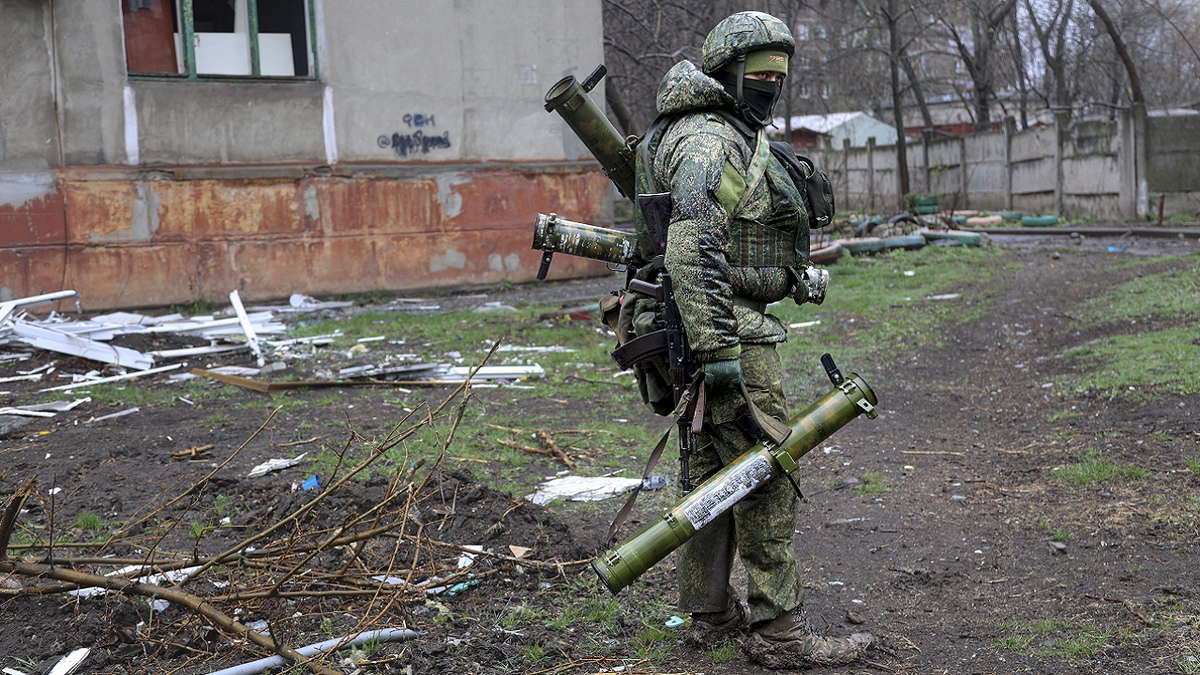Ukraine braces for continued escalation amid threats to Kyiv
Fox News correspondent Trey Yingst provides live updates of the Russia-Ukraine war and the impending investigation of suspected war crimes committed by Russia on 'Your World.'
General Mark Milley, the chairman of the Joint Chiefs, testified that the war in Ukraine is likely to go on for "years." What are the indicators that war could last "years" and what might be the consequences for the West?
Predicting how long a war might last isn’t a precise science. In August 1914, German Emperor Wilhelm II promised his deploying troops they would be home before winter. Meanwhile, his Chief of the German General Staff predicted what became the First World War would last up to two years.

An armed serviceman of Donetsk People's Republic militia walks past a building damaged during fighting in Mariupol on Wednesday. (AP/Alexei Alexandrov)
Soon both German leaders faced a new reality. The ensuing fight pitted two great alliance blocs, the Triple Entente and the Triple Alliance, involved millions of soldiers, consumed the lifeblood of entire nations, and ultimately lasted four and a half years.
The costs of that "War to End All Wars," which involved more than 100 countries were staggering: as much as $337 billion in direct and indirect costs. The human toll was equally sobering: 12 million dead and 20 million severely wounded.
Seven weeks into the Ukraine war, no one is predicting the fight will mushroom into World War III much less be as expensive and bloody as the First World War. However, it’s clear that Moscow isn’t finished and the toll in blood and treasure will grow.
Russian President Vladimir Putin appears to have abandoned his hopes of capturing Ukraine’s capital city of Kyiv and is now focused on the Donbas and Luhansk regions. Russian movements suggest their forces hope to encircle the Ukrainian army’s most capable combat units in the east and force a surrender, destroying any hope Kyiv has of regaining control over the east.
So, given Putin’s changed plans, what are the indicators that persuaded General Milley that the war is likely to last "years"?
First, Russia appears to have adopted a new, harsher strategy. President Putin replaced his field commander seeking different results, no matter how long it takes. He selected Gen. Alexander Dvorikov, a man known as the "Butcher of Syria," to oversee the fresh assault on Ukraine.
However, there is a problem for Russia with a new albeit harsher strategy. Time is not on their side. Khrystyna Holynska, a RAND defense and security policy researcher reminds us "This is still the same Russian military with low morale, distrust in the ranks, weapons systems and logistics problems, and many other issues that have been widely discussed" and they "cannot be solved quickly."
Second, due to heavy losses in tanks and troops, Putin has dipped into his reserves, a pool of two million men, to mobilize 20 Russian National Guard units. This is the first time the Rosgvardiya has been mobilized for anything other than rear area operations. Calling up these units and putting them into the fight indicates Moscow’s forces are severely stretched, or he’s holding back his best fighters for other operations, perhaps evidence of fighting elsewhere.
Third, the Ukrainians are taking the fight to Russia, which could extend the war. Russian regional authorities along Ukraine’s border increased the terrorism threat level because of the presence of Ukrainian special operations forces intent on sabotage attacks. For example, on April 1st a Ukrainian Mi-24 helicopter attacked a Russian oil depot in Belgorod and again on April 12th a railroad track inside Russia leading to Kharkov, Ukraine was sabotaged, another indicator of Kyiv’s intent.
Fourth, the Ukrainians will long hold a grudge against Russia for their war crimes, which will likely extend the fighting.The Ukrainians surprised the Russians with their resilience, but it is the Russian atrocities, such as in Bucha, that will fuel their anger against Moscow for decades to come.
Fifth, the longevity of the war is directly tethered to continued Western support to Ukraine such as the flow of arms. Military assistance to Ukraine is pouring in from the West to sustain the Ukrainian fight. Slovakia is providing S-300 air defense systems, the Czech Republic is sending T-72 tanks and the US is sending thousands of Javelin anti-armor weapons, artillery and radars, and more than a thousand Stinger shoulder-fired surface-to-air missiles along with hundreds of Switchblade suicide drones.
Regardless of Ukraine’s efforts and the West’s flow of arms, Moscow is ultimately capable of committing more assets than Ukraine which means over time the Kremlin’s mass could ultimately crush Ukraine’s better tactics, and home field advantage, especially should the West grow weary of financing that war.
Finally, Putin calculates that he can resource a long war thanks to two key Russian exports, energy and grain. The West’s crippling sanctions are failing to break Moscow’s ambitions to sustain its "Special Military Operation." In fact, Russia expects to earn almost $10 billion in additional revenue from energy sales in April 2022, thanks to high oil prices.
Further, the Biden administration’s sanctions will "… not affect this war in the short run, because Russia’s military is fighting with tanks it had already built and soldiers it had already trained," said, Johan Norberg, an analyst at the Swedish Defense Research Agency. Besides, Moscow can comfortably pay for the war because it can simply commandeer resources like fuel from state-owned companies.
These indicators can be understood as prolonging the war. Alternatively, Russia’s new focus could position Putin to claim a quick "victory" followed by a ceasefire along a new line of control in Donbas. Then Putin celebrates his "victory" at the annual May 9th World War II Victory Day celebration at the Kremlin.
Whether the fight continues for years or is cut short, there are long-term questions for the West which require answers.
CLICK HERE TO GET THE OPINION NEWSLETTER
Will NATO permanently station forces along Russia’s border to make it clear the West will not tolerate more aggression? Will the European Union wean itself off Russian fuel to deny Putin the means to fund his authoritarianism? Will the US continue to stand shoulder-to-shoulder with its NATO allies to counter Moscow?
CLICK HERE TO GET THE FOX NEWS APP
What we know from history is that wars change things: boundaries, governments, economies and cultures. The Ukraine war may stiffen the spine of the West to advance freedom and prosperity. Alternatively, it may create a black swan-like scenario that fades Ukrainian resiliency and Western help, whereas change favors Putin. At this point, the best advice for the armchair generals, is to avoid staking our policies on which way the war might go and how long – "years," or end next month.















































